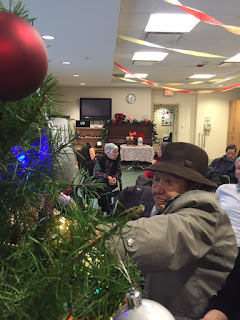Please scroll down to find the calendar for the appropriate site (SVADP or Beulah ADP)
Thursday 24 December 2015
Wednesday 23 December 2015
Friday 18 December 2015
Merry Christmas and Happy Holidays
Thank you to all of the participants, friends, family, caregivers and volunteers who joined us for our Christmas Parties. We love celebrating the holiday season with you all!
We will be open for regular hours December 21st to the 24th.
We would like to remind everyone that both South Vancouver and Beulah Adult Day Programs will be closed December 25th and will remain closed for the following week December 28th until the 1st of January.
Both centres will reopen for regular hours starting January 4th 2016.
Wednesday 16 December 2015
Person-Centered Care for Residents with Dementia Exhibiting Aggressive Behavior
Reposted from Info Long-Term Care
The U. S. Department of Health & Human Services Agency for Healthcare Research and Quality aims to advance excellence in health care through the promotion of research and dissemination of best practice information. One of the ways they achieve these goals is the Innovations Exchange, a formal online forum where researchers and clinicians can exchange knowledge about tools and innovations that are improving quality and reducing disparities in health care.
One of the series in the Innovations Exchange is the Service Delivery Innovation Profile, where facilities can profile their services and models of service in a detailed way providing information such as what problems were addressed to specific staffing needs to address these problems.
The Service Delivery Innovation Profile featured here is entitled, “Person-Centered Care for Residents with Dementia Exhibiting Aggressive Behavior Reduces Psychiatric Hospitalizations and Behavior-Related Medications.”
This resource can be accessed here: http://1.usa.gov/1Owclly
|
Friday 11 December 2015
Reducing Stress during the holidays
Reduce stress this holiday season
For many, the holiday season is a joyful time filled with festive activities and gatherings with family and friends. But it can also be overwhelming, particularly for people affected by dementia. With some adjustments to holiday traditions, persons living with dementia and their families can still enjoy the season and even create new traditions. Read the Alzheimer Society of B.C.'s Holiday Tips, which offers information to help make the season special and successful for those affected by dementia.
Supporting Caregivers at Home
Reposted from Info Long-Term Care
The Canadian Patient Safety Institute (CPSI) conducted a study which found that many family caregivers experience high levels of distress when providing care to those with long-term health conditions or difficulties associated with aging.
CPSI aimed to address caregivers’ need for support in their Resource Guide for Supporting Caregivers at Home – For Clients and Family Caregivers (2014). Without meeting caregiver needs, individuals who need their care are at higher risk of admission into acute or long-term care facilities.
This resource can be accessed by clicking here: http://bit.ly/1R9ZM5q
CPSI aimed to address caregivers’ need for support in their Resource Guide for Supporting Caregivers at Home – For Clients and Family Caregivers (2014). Without meeting caregiver needs, individuals who need their care are at higher risk of admission into acute or long-term care facilities.
This resource can be accessed by clicking here: http://bit.ly/1R9ZM5q
Friday 4 December 2015
Thursday 3 December 2015
Invitation to Christmas Lunch at South Vancouver ADP
Invitation to Christmas Lunch at South Vancouver ADP
To the families and care partners of the our program participants of South Vancouver Adult Day Program:
It would be our pleasure for you to join us in our Christmas luncheon
on Friday December 18th, 2015 at noon.
There will be carols, turkey lunch with all the trimmings, and a visit from
Incontinence: The Canadian Perspective
The Canadian Continence Foundation (CCF) publishes a number of resources for Canadian health care consumers and providers on continence-related issues.
This CCF publication entitled, “Incontinence: The Canadian Perspective” prepared by the Cameron Institute outlines all types of continence-related issues including their causes, their burden on health care, their influence on quality of life, and available treatments.
Also of interest within this publication is a section where urinary incontinence is cited as the most common cause of admission to long term care facilities in Canada and the United States at present. Rates of incontinence rise dramatically (9 to 10 times) for elderly residents of long term care facilities compared to community dwelling elderly.
This resource can be accessed by clicking here: http://bit.ly/1MWrLS8
Subscribe to:
Posts (Atom)














